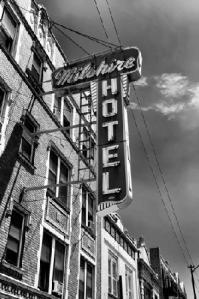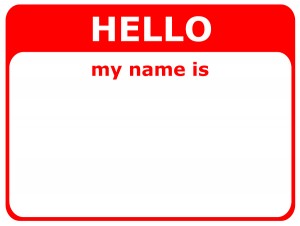Texts: Genesis 32:22-31 + Psalm 17:1-7,15 + Romans 9:1-5 + Matthew 14:13-21
“What is your name?” is the question the divine figure asks Jacob at the end of a long night of wrestling by the river. On its own it’s not a very remarkable question. In fact aside from, perhaps, “how are you?” it’s got to be one of the most frequently asked questions and the one we’re readiest to answer. “Hi, I’m Erik, what’s your name?”
The question is odd though, since it’s being asked by a figure that Jacob later identifies with God when he says, “I have seen God face to face, and yet my life is preserved.” (Gen. 32:30) We must assume that God knows Jacob’s name, and that God’s question is intentional. So, why is God asking Jacob for his name?
The question comes at the end of an incredible struggle, not just that night but throughout his life. Jacob, you may remember, had a twin brother, Esau. Born together, but separated by their interests, their assets and their inheritances, Jacob and Esau had a troubled relationship as brothers. Early on, Jacob shows his envy of his brother’s birthright as the eldest son, a birthright Esau treats lightly, trading it for a bowl of lentil soup.
Later Jacob conspires with his mother, Rebekah, to trick his father into bestowing the blessing intended for Esau onto himself. Disguising himself as his brother, Jacob approaches Father Isaac, who has become nearly blind in his old age. “Who are you, my son?” Isaac asks. “I am Esau, your firstborn,” Jacob replies. After a few rounds of this questioning, Isaac grants Jacob the blessing intended for Esau.
On one level we admire Jacob. He is clever, he is tenacious, he is goal-oriented and directed. He goes after what he wants and writes his own story. He is what we have been taught to be. On the other hand, what a tragic figure. He is the younger brother always living in the shadow of his older brother. He is the insecure son, wishing his father would do for him what he has promised to do for another. Furthermore, Jacob’s identity crisis creates new problems. Fleeing from his Esau’s vengeance, Jacob spends years away from his family among his uncle’s people, where he is on the receiving end of the same kind of trickery that got him into this predicament.
Finally Jacob is ready to be reconciled with his brother, to bring an end to a lifetime of struggle. So he sends word to Esau that he is coming to meet him along with all his wives and children and servants and wealth, a sign that he’s done well for himself. Word comes back that Esau is coming to meet him as well, and that he’s brought four hundred men along with him. It sounds like trouble, but who can be sure? They’ve been competing with one another their whole lives, a struggle that’s been leading to this moment. Will it be a moment of conflict, or a moment of reconciliation? No one knows.
So when Jacob encounters the divine figure in the night by the banks of the river Jabbok, he has already been wrestling for a very long time with the question of his identity. Who is he trying to be? Has he learned anything from his lifelong struggle with jealousy? Has he outgrown his habit of taking whatever he wants, regardless of the cost? Is he ready to live the life God has in store for him, to receive the blessing God wants to give to him? Has he come to grips with who he is? Does he know his own name?
God’s question to Jacob, “what is your name?” is what makes this story so powerful and so accessible to people of every time and place. Who among us doesn’t struggle with trying to understand who we are and why we do the things we do? Who hasn’t looked back over their lives and seen how the desire to be someone else, to live someone else’s life, has destroyed the happiness or the future with which God was trying to bless us? We all know what it’s like to look in the mirror, to see the image of our own face looking back at us, eyes red from crying, skin etched with the map of the years, and wonder who that is looking back at us. Or we will.
What is your name?
 It’s a question we get asked not only as people, but as neighborhoods, as nations. Residents at the Milshire Hotel, organizing in the face of eviction notices; the community at Lathrop Homes, calling attention to the millions of dollars and hundreds of housing vouchers being hoarded by the CHA; the swell of working class neighbors whose affordable rental housing is quickly disappearing from Logan Square, are all asking their neighbors, “what is your name?” Families in Gaza, fleeing the rubble of bombed out homes and hospitals are calling out to the world as it watches, “what is your name?” Children leaving lives of danger and desperation are showing up along our southern border, climbing fences and crossing rivers and as we struggle next to those waters, God is asking us, “what is your name?”
It’s a question we get asked not only as people, but as neighborhoods, as nations. Residents at the Milshire Hotel, organizing in the face of eviction notices; the community at Lathrop Homes, calling attention to the millions of dollars and hundreds of housing vouchers being hoarded by the CHA; the swell of working class neighbors whose affordable rental housing is quickly disappearing from Logan Square, are all asking their neighbors, “what is your name?” Families in Gaza, fleeing the rubble of bombed out homes and hospitals are calling out to the world as it watches, “what is your name?” Children leaving lives of danger and desperation are showing up along our southern border, climbing fences and crossing rivers and as we struggle next to those waters, God is asking us, “what is your name?”
It’s a question we have been asking ourselves as well, as a congregation, for many years. We, who came into this world like fraternal twins during an era when congregations were being birthed at the same time all over this city, we might look around and see other congregations that are thriving in ways that make us long for easier times, that might make us wish we’d been granted a different blessing, that we had a different identity, that we were living some other congregation’s life. I know I feel that way sometimes. I grew up in a large Lutheran church with hundreds of members, multiple pastors, a youth program that drew children and families in from miles away, and enough money to put staff time into a wide range of ministries, local and global. I know what it’s like to wish for someone else’s blessings, and so do you.
Some of you are of an age that you remember when the church was something your parents and other adults provided for you, when church — like school — was a program designed to mold and nurture you, to meet your needs. You may be longing for the blessings of a church that manages itself, that can get by without you, but will still be here when you drop in.
Others of you remember very different days here at St. Luke’s, when the pews were fuller and families were more settled. Times when you knew everybody’s names, and they knew yours, and you had relationships that went back decades. When everyone knew the same songs, and loved the same food, and cherished the same traditions. You may be longing for the blessings of a church that can preserve the treasures of the past in spite of all that’s changing in the present.
I spent the last two days with your Church Council and the members of the Strategic Listening Team as they read through and discussed all the feedback and stories they gleaned from each of you through the last three months of interviews about your experience of St. Luke’s. Here’s what I want you to know: you have an incredible Church Council that cares very much about you and your families, that wants to preserve this congregation’s legacy even as it shapes its future. Many of you already know this, because you have taken a turn or two on Council, and you know how hard, but also how rewarding, that work can be. They have heard your calls for improved ministry to children and families, they have heard the need for small groups and social gatherings that make it easier for newcomers to find a home in the congregation, they have heard your concerns about the state of our property and your questions about how much longer we can sustain it. They are wrestling, and wrestling, and wrestling — so much so that it feels like they’ve been wrestling all night long, holding on for a blessing. As they continue to work, as they listen to your input and invite your participation in plotting the course for our shared future, the question before them is the same question God put to Jacob:
What is your name?
Who are we? Not “who do we wish we were?” Not even “who do we think we ought to be?” But, “who are we?” What is our name? What is our identity? We see the blessings God has prepared for our brothers and sisters elsewhere, we may even covet them, but God has a blessing in store for us as well — a blessing that is already present among us, like loaves and fishes, a blessing that is more than enough for the future into which God is calling us.
The next day, after wrestling with God all night long, a struggle that left Jacob with a limp for the rest of his days, he went out to meet his brother and see what the future held. In the distance he could see Esau and the four hundred men advancing on him, but once they were close enough to see each other face to face, Esau ran to met Jacob and fell into his arms and together they wept for all that had passed between them. Jacob blessed Esau, saying, “please accept my blessing that is brought to you, because God has dealt graciously with me, and because I have enough.” (Gen. 33:11)
Friends, that is the spirit in which we will find our blessings. When we can look at ourselves in the mirror, accept ourselves for who we are and who God created us to be, when we can stop coveting the blessings of our brothers and sisters and can instead count the blessings God has already given each one of us; when, out of gratitude we can release all we may have been hiding or hoarding for the sake of those in need, those who are all — in the final analysis — our sisters and brothers, then there will be enough to care for the whole world and more.
Amen.
